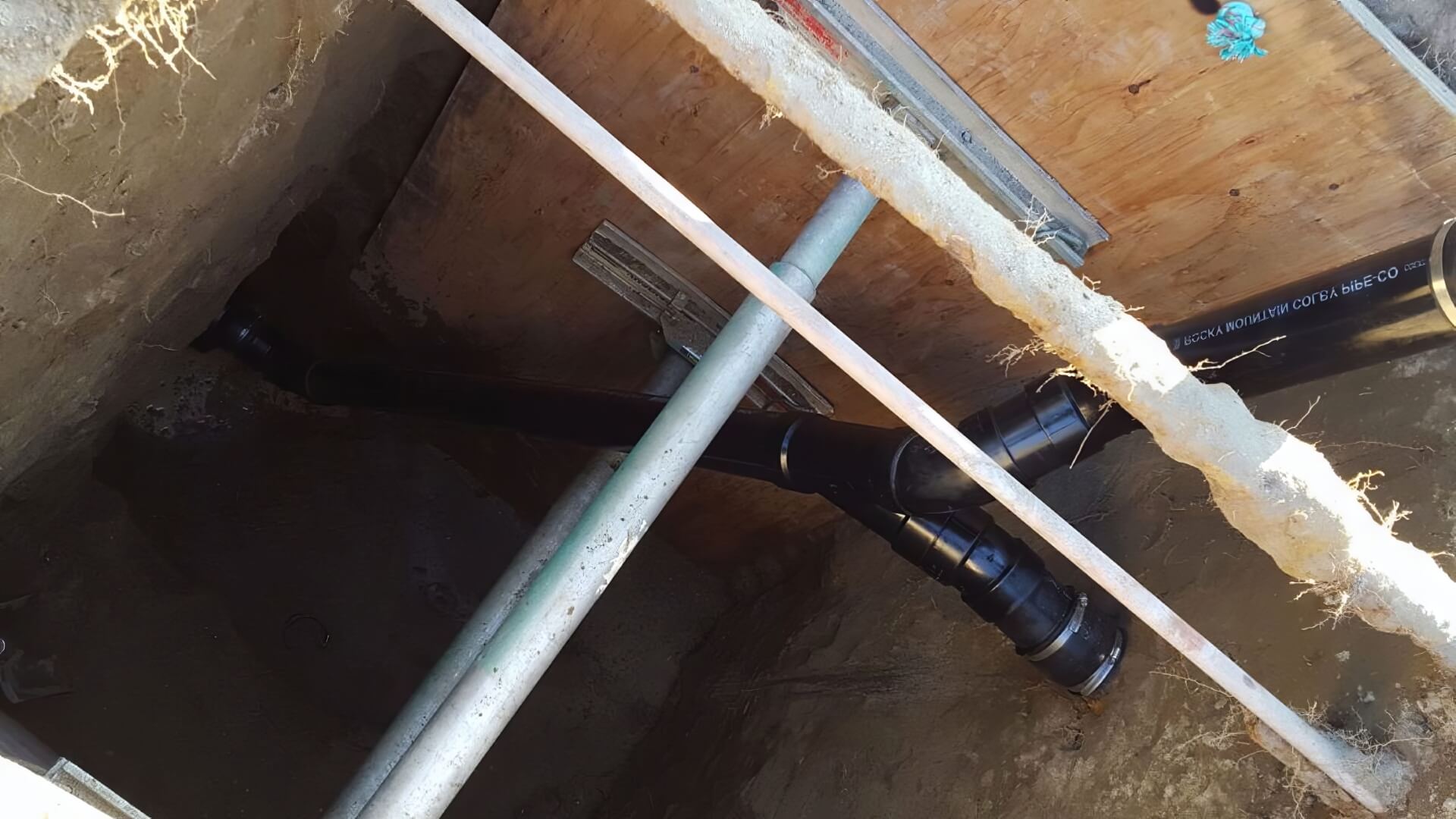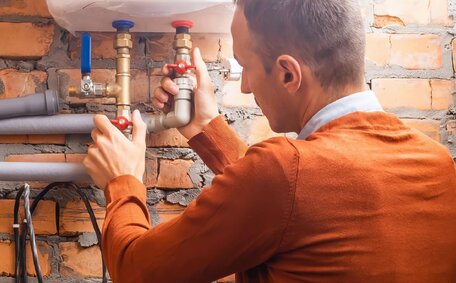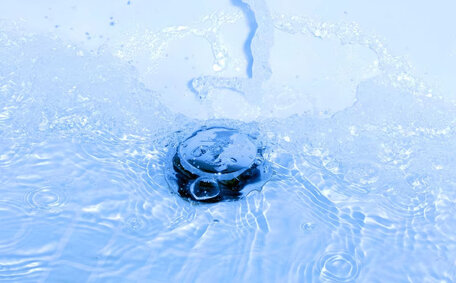What is pipe relining and how does it work?
Pipe relining, or Cured-In-Place Pipelining (CIPP), is a trenchless technology for repairing pipes without excavation. Unlike traditional methods, pipe relining involves inserting a resin-soaked liner into the old pipe and curing it in situ, creating a robust new pipe within the old one.
Initially, plumbers conduct a drain camera inspection to pinpoint problems within your sewer system’s pipes. Next, precise measurements of the damaged sections guide the custom cutting of a felt liner. The liner is coated with durable epoxy resin, remaining flexible for insertion before hardening in the pipe.
Our specialised sewer pipe repair techniques insert the resin-coated liner into your pipes via access points such as manholes. Using air pressure or water, the liner is guided and then cured with hot water or steam, creating a new, smooth-surfaced pipe within the original structure.
The liner adheres to the inner pipe walls, sealing off any cracks or holes.
Pipe relining enhances structural stability, repairs pipes, prevents leaks and contamination, lengthens lifespan, and is cost-effective versus full pipe replacement. With no digging required, it’s less invasive and minimises disruption to your daily life.
Step-by-step overview of the pipe relining process
- Initial Inspection: Licensed plumbers start with a drain camera inspection to identify issues for repair.
- Measurement: Precise dimensions of the pipes are taken for a tailor-made epoxy-coated liner.
- Bypass Setup: Temporary bypass pumping is arranged to keep water flowing during the relining.
- Installation: The resin-laden liner is skillfully fed into the pipe via an access point.
- Curing: Hot water or steam cures the resin, solidifying the liner into a new pipe.
- Finishing: Service lines are reopened post-cure, with equipment then removed.
- Final Inspection: A second camera inspection confirms the seal and success of the relining.
Pipe relining offers an internal repair solution that avoids the costly and disruptive digging associated with traditional methods, ensuring lasting results for your plumbing system.
Pipe relining materials and safety for drinking water
The epoxy pipe resin used in pipe relining is specially formulated to be compatible with your house’s potable water systems, including water mains, and even fire suppression systems. It is ANSI/NSF 61 certified for contact with drinking water, meaning it complies with strict standards for water quality and safety.
When correctly applied, the new lining forms a protective barrier in relined pipes, blocking contaminants like lead from leaching into water. The resulting smooth surface reduces corrosion and buildup, thereby ensuring better water quality, particularly in areas with aging lead pipes.
The fully cured epoxy is free from chemicals that could pose health risks or alter water’s taste, colour, or odour. Installation odours dissipate after curing, leaving only a safe, resilient epoxy barrier in contact with your water.
Pipe relining with epoxy resin is a no-dig, safe, and effective method for renewing old pipes and safeguarding your drinking water quality for the long haul.
Comparing pipe relining vs traditional pipe replacement
The choice between pipe relining and full pipe replacement involves very different approaches to restoring your household piping system, with key contrasts in:
- Cost: Pipe relining is more affordable than replacement, often costing above $80 per metre compared to over $400 per metre for full replacement.
- Time: Typically completed within a day, drain relining bypasses the need for excavation, unlike the more time-consuming replacement process.
- Disruption: Unlike pipe replacement, which may disrupt your yard, trenchless pipe relining requires no excavation.
- Structural integrity: Pipe relining restores full strength and integrity by creating a robust pipe within the existing one when performed correctly.
- Flow efficiency: The smooth epoxy barrier enhances water pressure, water flow and waste drainage capacity.
- Contamination prevention: The lining technique seals deficiencies and forms a protective barrier that safeguards drinking water.
- Durability: With proper curing, pipe lining has an expected lifespan often exceeding 50 years.
With its numerous advantages, pipe relining is the best choice for repairing structurally sound yet worn pipes, providing an internal restoration with less cost and disruption while ensuring long-term safety for your drinking water.
When should you choose pipe relining over replacement?
If the existing pipe structure is sound, pipe relining offers a more efficient restoration alternative to full replacement, renewing pipes internally with our trenchless technique.
Circumstances favouring pipe relining over full replacement are:
- Pinhole leaks or cracks allowing water to seep. Relining seals these openings.
- Blocked drains or drain pipe relining can address lines clogged with tree roots, grease or mineral deposits. The smooth epoxy barrier increases flow.
- Pipes need attention when showing corrosion, wear or small perforations, and relining serves to reinforce strength.
- Locations with pipes under landscaping or concrete slabs benefit from no-dig relining, minimising disruption.
- Restricted access like pipes behind walls or under concrete slabs. The flexible resin liner enables insertion.
Full pipe replacement is required for severe damage or complete failure, such as a broken pipe. However, in many cases, our skilled plumbers can evaluate if trenchless pipe relining is the best solution, demonstrating swift pipe restoration without the need for disruptive excavation.
Our pipe relining technique delivers lasting durability comparable to new pipe installations but without the disturbance to your premises. Get in touch for an onsite inspection and assessment of relining feasibility.
Choosing a professional pipe relining service
Choose a pipe relining provider with demonstrated expertise and experience. Ryde Plumbing has been servicing the Sydney region for over 30 years, earning a reputation for excellence in trenchless pipe repairs.
Important criteria for selecting a pipe relining company are:
- Industry qualifications - Choose a licenced, insured and accredited plumbing business like ours.
- Specialist expertise - Opt for a provider focused on trenchless pipe relining instead of general services.
- Proven experience - Ask about years in business, projects completed, and client reviews.
- Custom solutions - They should offer bespoke liner installation based on pipe inspection.
- Quality materials - Medical-grade epoxy resins should meet drinking water standards.
- Warranties - Reputable companies offer guarantees on pipe relining workmanship.
Contact Ryde Plumbing for dependable local pipe relining services across the North Shore and eastern suburbs. Reach out at 1300 349 338 or via [email protected] for tailored assistance.






